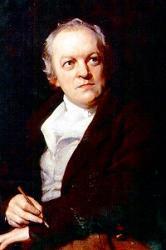1757 - 1827 Person Name: William Blake, 1757-1827 Author of "Every Night and Every Morn" in Singing the Living Tradition Blake, William, poet and painter, born 1757, and died 1827. Published Songs of Innocence in 1789, in which appeared a poem in 9 stanzas of 4 lines beginning. "Can I see another's woe" (Sympathy), and headed "On Another's Sorrow." (See also The Poems of William Blake, &c, Lond., W. Pickering, 1874, p. 105.) This poem is repeated in Martineau's Hymns, &c, 1873, and others.
--John Julian, Dictionary of Hymnology, Appendix, Part II (1907)
====================
Blake, William, p. 1553, ii. Another poem from his Songs of Innocence is "To Mercy, Pity, Peace and Love." In 1789 ed., p. 17, it is entitled "The Divine Image." The English Hymnal, 1906, No. 506, ranks it among General Hymns. It is certainly difficult to call it a hymn at all, or to assign it to any special purpose. [Rev. James Mearns, M.A.]
--John Julian, Dictionary of Hymnology, New Supplement (1907)
William Blake


 My Starred Hymns
My Starred Hymns



